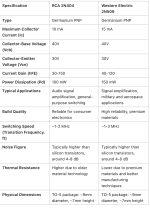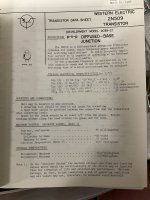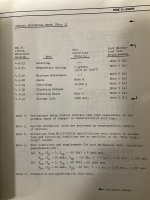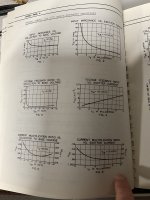Hey
@DeadAirMD....I was going to stay shut up on this.. But now you are moving into an area I was trying to politely say abreast of for all the same reasons, and worse.
I don't really want the last word here, and it's off topic. I don't think so of you guys want me starting any new threads.
I think you are right to want to compare specs.
I am curious where switching speed or, "slew rate" (for transistor's that's more like (ft) is of your favorite cheap devices. This is a key differing spec I am not seeing anyone mention. Schottkey diodes are way faster than Germanium I think.
There are allot of factors you guys may or may not be geeking out on, when it comes to Diodes... and Transistors are worse.
So will state some specs:
Transistors different beast.. more active in the context even of building pedals. Now you're talking about an active device providing amplification, and most certainly in your signal path. Also you and
@PedalBuilder are sort of saying differing. Pedalbuilder said it's not so much specs and viewing on a scope, it's more how it sounds.
OK, lets talk specs and ratings of "so called mojo stuff".
You are mentioning a 2N5088. That's not even germanium. That's a silicon, and of course it's going to have a much different operating characteristic and sound.
So lets compare some Germaniums... (Western Electric transistors, are not Germanium ~ they are actually Germanium Alloy)
(WE used an alloy to prevent the drift, and enhance heat stability among other things. While this may not lend itself to fidelity.. it sure as hell does sound and work a little different.)
Lets use some not perfect, but close examples... I drafted up a quick table using factory published specs with not much sales blather.
I chose a RCA 2N consumer transistor, but I think specs on other are about the same.
I should be comparing transistors intended strictly for audio. But there are not many of those, and the microwave and under transistors, mostly all work fine.
Based on specs... same package size.
All things being equal, you've got to say the WE looks at very least, interesting..compared to any other brand. .
You be the judge.
I am also attaching a photo of the specs, in which I drew this out of.
I think there is a much better argument for "diodes of equal specs all sounding the same".
But, the specs have to be the same. Since this was expensive military grade stuff, most of the specs are not the same, and cannot be easily equaled by any other brand in the same package. I am not saying they will sound better in your project, but I am saying they will be different and not easily matched by much else in your "mojo stash". Sometimes military, super grade, and aerospace stuff *does not* sound better in HiFi land. I always recommend consumer tubes, over RCA command series tubes for instance.
There may be a mistake here, so if there is something that you see crazy different, I have attached the real WE paper .
The Thermal Resistance, spec is referring to heat tolerance, not Electrical.
I have 3 more pages of specs, if anybody wants to see all of the charts.








